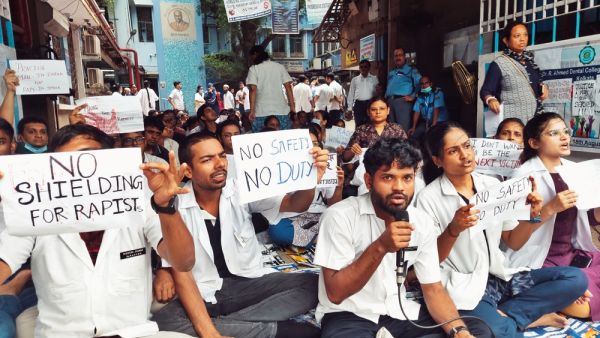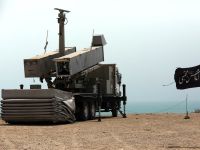All but emergency medical services came to a grinding halt across India on Saturday after tens of thousands of doctors went on a 24-hour strike in a show of anger and solidarity over the rape and murder of one of their own in Kolkata earlier this month.
Saturday’s protest, which began at 6am, marked the peaking of anger that has grown steadily in the aftermath of the August 9 killing of a 31-year-old doctor in Kolkata. Her body was found at one of the city’s largest government medical facilities with signs of a brutal assault that was meted out to her as she went to rest in the middle of a 36-hour shift.
“I don’t want to be the next victim,” read placards carried by several women doctors who were part of a march in the national capital’s central district.
The strike extended from the country’s metropolises to its villages, with all services except for critical and emergency care particularly halted in the states of Delhi, West Bengal, Uttar Pradesh, Madhya Pradesh and Gujarat.
Saturday’s shutdown was called by the Indian Medical Association (IMA), which says it has 400,000 members. Patients were turned away at most prominent hospitals — government and private — as outpatient departments (OPDs), non-emergency diagnostics services, and surgeries were halted.
The IMA said it was looking for a gesture from the government ensuring the safety and security of health care workers. IMA president Dr RV Asokan, said that “the time is ripe for Prime Minister Narendra Modi’s intervention”, adding that they have written to the PM.
“We appreciate your remarks about the safety of women in your Independence Day address. We appeal to you for your benign intervention at this stage. This will give confidence to not only women doctors but also to every woman in the workplace,” read the letter signed by RV Asokan, national president, IMA, and Anilkumar J Nayak, honorary secretary general.
“Sixty percent of Indian doctors are women. This percentage is as high as 68% in the dental profession, 75% in physiotherapy and 85% in nursing. All health care professionals deserve a peaceful ambiance, safety, and security at workplace. We are appealing for your benign intervention to ensure appropriate measures to meet our demands,” the letter added.
People across the country were caught unaware by the shutdown. “I am suffering from chest pain and doctors in my native district, Bahraich, referred me to Lari Cardiology Centre at King George’s Medical University, Lucknow. However, despite waiting till noon I could not see a doctor,” said Sudama (single name), 55, who said he would come back to the city on Monday.
Tarachand Yadav, who arrived at Government Medical College and Hospital, Purnea, Bihar, with his mother said: “My mother has a serious condition, she needs blood transfusion, but I am running from pillar to post and there is no doctor. I am afraid I will lose her”.
Doctors put forward a list of five demands in a letter to the government earlier in the week, including putting in place airport-like security in hospitals; a central law to check violence on health care workers; a dignified compensation for the family of the victim; a detailed investigation, time-bound prosecution and appropriate punishment for the culprits; and improvement in working hours and working conditions of the resident doctors.
The Union health ministry said it will form a committee to suggest possible measures to ensure the safety of health care professionals. Representatives of all stakeholders, including the state governments, will be invited to share their suggestions with the committee, it added. The ministry requested the agitating doctors to resume their duties in the larger public interest.
According to the data shared by the All India Institute of Medical Sciences (AIIMS) Delhi, nearly 80-90% of their non-emergency services — OPDs, admissions, operation theatres, laboratory services, radiological investigations, etc. — were impacted because of the strike. “The emergency services like casualty and intensive care units functioned,” said a senior official in the hospital, requesting anonymity.
The 31-year-old doctor whose death and assault has become the rallying point for the show of anger was a post-graduate trainee at the RG Kar Hospital in Kolkata. In the early hours of August 9, she was raped and murdered inside the seminar hall, where she had gone to rest. Immediately after her bloodied body was discovered, the administration first told her family it was a case of suicide, one among several controversial developments that ultimately led a court to order the case to be handed over to the Central Bureau of Investigation.
The autopsy indicated that the woman was brutalised and left with multiple broken bones. One man, Sanjay Roy, a 31-year-old civic volunteer with the police, has been arrested.
The IMA said it was overwhelmed with the response. “Doctors stand united against this injustice. Across all the sectors whether it’s private, government, or corporate doctors are in protest,” said Asokan.
The Association of Healthcare Providers (India) (AHPI) also expressed deep concern over the increasing instances of violence against medical professionals and said that despite repeated assurances from authorities about implementing preventive measures and legal provisions, the healthcare community continues to face threats.
In Kolkata, the epicentre of the protests, the shutdown was near-complete. “The OPD is closed. We are allowing only those patients who need consultation on an emergency basis,” said an official of a private hospital along EM Bypass in Kolkata.
In Lucknow, nearly 32,000 IMA member doctors abstained from OPD. “This was one of the most successful medical shutdown calls,” said Dr MM Paliwal, the president of IMA’s UP chapter. Doctors at Sanjay Gandhi Post Graduate Institute of Medical Sciences and KGMU marched on the hospital premises raising slogans. In Meerut, doctors took out the “Nyay Yatra”.
Similar scenes unfolded in medical facilities in Telangana and Andhra Pradesh — at Nizam’s Institute Of Medical Sciences, King George Hospital, Visakhapatnam, and at Government General Hospital, Vijayawada and Guntur, among others.
A section of hospitals in Delhi, however, were functioning partially. At the Fortis Escorts Heart Institute in Okhla, most doctors turned up for work and were available at the emergency as well as OPD. Patients said that they had expected that their appointments would be rescheduled, but it was not needed.








